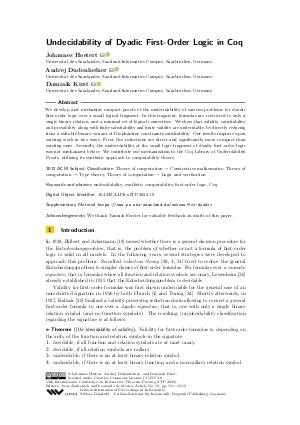@InProceedings{hostert_et_al:LIPIcs.ITP.2022.19,
author = {Hostert, Johannes and Dudenhefner, Andrej and Kirst, Dominik},
title = {{Undecidability of Dyadic First-Order Logic in Coq}},
booktitle = {13th International Conference on Interactive Theorem Proving (ITP 2022)},
pages = {19:1--19:19},
series = {Leibniz International Proceedings in Informatics (LIPIcs)},
ISBN = {978-3-95977-252-5},
ISSN = {1868-8969},
year = {2022},
volume = {237},
editor = {Andronick, June and de Moura, Leonardo},
publisher = {Schloss Dagstuhl -- Leibniz-Zentrum f{\"u}r Informatik},
address = {Dagstuhl, Germany},
URL = {https://drops.dagstuhl.de/entities/document/10.4230/LIPIcs.ITP.2022.19},
URN = {urn:nbn:de:0030-drops-167280},
doi = {10.4230/LIPIcs.ITP.2022.19},
annote = {Keywords: undecidability, synthetic computability, first-order logic, Coq}
}

 Creative Commons Attribution 4.0 International license
Creative Commons Attribution 4.0 International license







